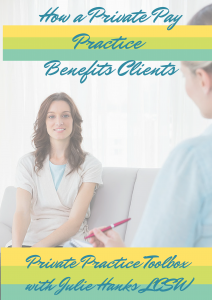 The value of using a private pay model (instead of a managed care system) for your therapy practice is clear: less stress about additional paperwork requirements, greater autonomy to provide the services you deem are in the client's best interest, and immediate payment of your full fee are some of the main advantages. But some therapists are understandably hesitant about how to make the switch because of the potential impact this choice it might have on their clients.
Some common fears are “Clients might stop getting the therapy they need because they can’t afford me” or “charging a higher fee is selfish and means I care more about money than helping people.” When I was considering making the switch, I too had thoughts like these cross my mind. But I discovered that the opposite was true; breaking up with managed care and embracing the new way of structuring my practice actually benefited clients who received services. Here are 4 ways that a private pay model benefits clients:
The value of using a private pay model (instead of a managed care system) for your therapy practice is clear: less stress about additional paperwork requirements, greater autonomy to provide the services you deem are in the client's best interest, and immediate payment of your full fee are some of the main advantages. But some therapists are understandably hesitant about how to make the switch because of the potential impact this choice it might have on their clients.
Some common fears are “Clients might stop getting the therapy they need because they can’t afford me” or “charging a higher fee is selfish and means I care more about money than helping people.” When I was considering making the switch, I too had thoughts like these cross my mind. But I discovered that the opposite was true; breaking up with managed care and embracing the new way of structuring my practice actually benefited clients who received services. Here are 4 ways that a private pay model benefits clients:
1) No Mandatory Diagnosis
Many managed care systems require that you diagnose a client's specific mental health condition condition prior to paying you for your services. In some cases, insurance companies will only pay for certain diagnoses. Often, relationship issues are not covered. However, this can turn in to serious ethical problems.
I remember years ago I was referred an urgent client - a child who was sexually assaulted. I determined that she had no clear-cut symptoms and didn't meet a diagnosis that her insurance benefits would cover. I was in a terrible dilemma: do I give an inaccurate diagnosis to satisfy the requirements of managed care, or do I get paid for the initial? No therapist should ever have to find him/herself in this kind of a situation, and no client should be subject to this either.
One of the best parts of employing a private pay model is that there is obviously no such requirement. Diagnosis can be used as a tool, but you are not obligated to provide one. By eliminating the need to diagnosis a condition that may or may not fully exist, you can ensure that your clients receive ethical, honest, and accurate care.
2) Higher Quality of Service
Back when I used a managed care system, I was receiving approximately 40-70% of my stated fee. This meant I was in survival mode, seeing more and more clients just to try to get by and meet my own financial needs. And all the while, I still had the stressful task of running the business side of things. It’s not surprising then that I wasn’t able to give as much to my clients. As much as I tried, unfortunately the standard of care I could provide was compromised. That was unfair to me and unfair to the people who were paying me to help them.
By changing to a private pay model, I was able to see fewer clients and, which reduced my stress, which allowed me to be more present for my clients. I also no longer spending hours per week on phone calls and paperwork that came with using a managed care system, which freed up my energy to give to those I served.
3) Better Therapist/Client Match
A private pay model also lends itself to a better fit between the therapist and the client. If you have fewer clients, you can be selective about the ones you see. The opposite is also true; if someone is willing to pay more for professional therapy, it’s likely that he/ she has done his/ her research and sought you out because of your specialty and the expertise you provide. To put it simply, you want them, and they want you.
I’ve found that using this financial model attracts highly-motivated clients. Although they are required to pay more, they place high value on therapy and budget accordingly.
4) More Clients Reached
A private pay therapy model allows you to have a greater outreach and help more clients. This may initially seem counter-intuitive; how does seeing less clients serve more people? The answer is that if you have a surplus of potential clients or have people come to you with needs that are different that the expertise of your practice, you can refer them to trusted outside resources. You’re helping other therapists while simultaneously ensuring that clients receive the best care specifically for them.
The other thing I have found is that the income stability provided by a private pay model allows my colleagues and me to do more pro bono work. Paradoxically, because we earn more, we can provide more volunteer service when we choose.
All in all, switching to a private pay model was one of the best business decisions I made to benefit not only myself, not only my practice, but the clients and the community we serve. Charging a higher fee does not mean you are inconsiderate or selfish; it means you are valuing yourself and providing the best quality care to your clients.
*If you find that finances are legitimately a concern for some of your clients, you may decide to provide alternative choices, such as reduced fee sessions with Masters’ student interns. My practice Wasatch Family Therapy does this, and it works well for those looking for a more affordable option.
Get practice tips and blog updates in your inbox. Sign up for the Private Practice Toolbox Newsletter here.
Learn about my private practice consulting
Join my Private Practice Toolbox Facebook group and connect with 3000 therapists around the globe in 2 simple steps: 1) Click request to join the group and 2) Fill out this brief questionnaire before you'll be added to the group.




As healers, we genuinely like to do our work. Guiding clients through the therapy process and seeing them make progress is why we do what we do. But if you're in private practice, you know there's a lot going on in the back end and that it's crucial to run an efficient and organized business.